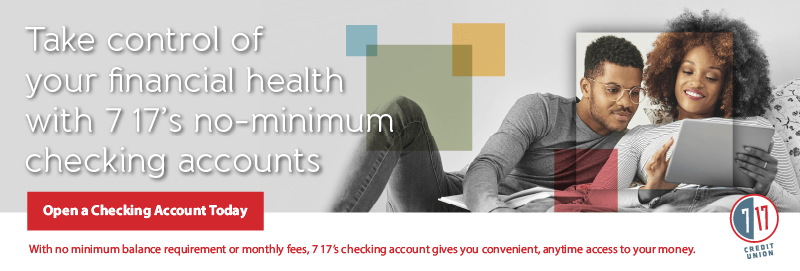- 7 17 Staff
5 Ways to Protect Yourself Against Fraud

Waking up to a message from your bank or credit union alerting you to about a dozen purchases that you didn’t make can be deeply unsettling. If you’ve ever been in a similar situation, you know the stress isn’t just about the money, but about not knowing how to fix the issue, the fear of what else might be compromised, and the frustrating sense of violation.
Fraud and scams are everywhere, and the tactics criminals use are constantly changing. It's easy to feel overwhelmed, but protecting yourself doesn’t have to be complicated.
By staying aware and taking a few simple steps, you can significantly reduce your risk of financial fraud.
This post will walk you through five essential fraud prevention tips to help you protect your identity, your accounts, and your peace of mind.
1. Monitor Your Accounts Regularly
One of the most effective ways to spot fraud is to keep a close eye on your financial accounts. Make it a habit to check your credit and debit card statements regularly — even daily or weekly — if you can.
Look for charges you don’t recognize or login attempts that seem off. If you notice a small, odd charge, don't dismiss it. Sometimes, criminals will test a card with a minor purchase to see if it works before making a larger one. If something feels suspicious, it’s worth investigating.
If actively checking your accounts seems like a big lift or if you don’t know how often you should check, many mobile banking apps allow you to set up alerts for transactions over a certain amount or for specific types of activity. This can give you a heads-up the moment something unusual happens.
2. Use Strong Passwords and Two-Factor Authentication
You’ve probably heard this before, but it's worth repeating: Strong, unique passwords are your first and most solid line of defense. Here are the three golden rules of passwords:
- Avoid using the same password for multiple accounts. If a hacker gets one password, they could gain access to everything.
- Consider using a password manager — an encrypted vault that stores and organizes your login information securely — so you only have to remember one master password.
- Turn on two-factor authentication (2FA) wherever possible. This requires a second form of verification, like a code sent to your phone, in addition to your password. This extra step makes it much harder for someone to access your accounts, even if they have your password.
3. Watch Out for Phishing Scams
Phishing is a common type of fraud in which scammers pretend to be a trusted company or person to steal your information. They might send you an email or text message that looks legitimate, with an urgent warning about your account.
Be skeptical of any message that asks you to click a link or download an attachment. Your financial institution will never ask for sensitive information such as your Social Security number, password, or account details via email or text.
Always look for red flags, such as a strange sender email address, spelling and grammar mistakes, or a sense of urgency meant to make you act without thinking. When in doubt, go directly to the official website or app to log in, or call the company using a number you know is correct. You can also review resources from organizations like the National Credit Union Administration to learn more about identifying scams.
4. Secure Your Devices and Internet Connection
Your digital devices are gateways to your financial life, so keeping them secure is key. Make sure your phone, tablet, and computer are always updated with the latest software and security patches. These updates often fix vulnerabilities that criminals could exploit. It’s also wise to install and maintain antivirus or anti-malware software.
Be careful when using public Wi-Fi. Networks at coffee shops or airports are often not secure, which means your personal information could be at risk. Avoid conducting any financial transactions, like making a payment, on a public network. If you need to work remotely, a trusted VPN can help encrypt your connection.
5. Report Fraud Immediately
If you spot something suspicious, acting quickly is the most important thing you can do. The sooner fraud is reported, the more damage can be prevented and the faster your financial institution can help resolve the issue.
If you see a charge you don’t recognize or if you think your account has been compromised, contact your bank or credit union right away. They can help you freeze or cancel your cards and take other steps to secure your accounts. Fast action can make a major difference in limiting the impact of fraud.
Stay Informed and Stay Vigilant
Fraud tactics are always evolving, but so are the tools and knowledge available to you.
Trusting your gut instinct is an important tool. If something feels off — a phone call that sounds too good to be true, an email that seems a little bit wrong — it’s always worth a closer look. But it’s also important to partner with a financial institution that keeps up with new scams and employs effective fraud prevention strategies.
If you want to keep your finances safer with local, personalized support, explore secure, smart checking with 7 17 Credit Union. And, if you’re interested in specific resources relating to ID theft and fraud, we have practical pointers and more for you right here.
